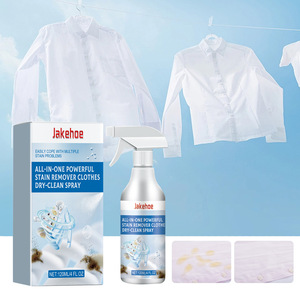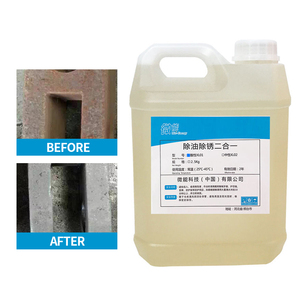(833 products available)





























































































































































































Rust stains, a frequent adversary of numerous fabrics, can transform a set of preferred clothes into a point of concern over time. Fortunately, various products are available to counter these stubborn stains effectually. These products can be classified based on their format and composition.
Chemical-based removers are the most efficient in eradicating rust stains. They are ideal when the stains are heavily committed to the fabric. Most of these products comprise oxalic or phosphoric acid, which makes rust dissolution possible. Common examples in this category include:
Natural removers are an excellent alternative for those who want to avoid harsh chemicals. They may take longer to work, but they are gentler on fabric and the environment. These items usually include a combination of ingredients such as lemon juice, vinegar, and baking soda. Common examples in this category include:
Besides removal products, preventive solutions can assist in avoiding rust stains on clothes. Such products are ideal for individuals who constantly face rust problems. The available options include:
The effectiveness of rust stain removers generally differs according to the following specifications:
For chemical-based rust removers, active elements are among the primary factors influencing the remover's efficacy. Removers with phosphoric acid are commonly considered safe for many fabrics. However, they should be used cautiously since they can sometimes react with specific fibers. Oxalic acid is stronger, suitable for set stains, but might be incompatible with bleach-sensitive fabrics. As for natural remedies, vinegar and lemon juice are less potent but indulge in the rust without harming the fabric.
Application plays a crucial role, especially when dealing with multi-stained items. Liquid rust removers are typically applied manually so that the treatment is focused only on the affected areas. Powdered and liquid can also be applied with a brush or spray. Wipes offer immediate access but are suitable for children's clothes and smaller stains. While all application methods aim at rust stain removal, users must choose a method that complements their lifestyle and the types of clothes affected.
When buying rust removers, compatibility comes into play due to its effect on the fabric used. All-natural options are safe for all (cotton, linen, polyester, etc.). On the flip side, chemical-based removers are not suited for porous materials like silk, wool, or acrylic. Ironing clothes with rust stains can make things worse. Make sure to get rid of the rust first before ironing, as the heat will cause the stains to set permanently.
Account for treatment time when assessing the convenience of rust removers. Removers take longer when they are washed after applying or rinsing the clothes. For instance, applying rust remover wipes requires a few minutes to wipe the clothes. Applying liquid rust stains may require a few minutes, although washes will be longer. In addition, some chemical-based removers may require users to leave them for a while before completely washing them. Anticipation is key so that owners do not stain clothes during applications.
The clothes rust stain removers have several applications, and here are some of them.
The most common place for rust stain removers is household laundry. Rust stains can occur in various places, such as bathrooms, kitchens, and laundry rooms, due to moisture, metal contact, or poor storage. Owners must have reliable removers to protect their preferred clothes and fabrics. These products are especially important for families with kids and pets, as spills or playtime can frequently cause rust exposure.
Industrial or manufacturing plants handling metal tools or machinery frequently encounter rust stains. These stains typically transfer to work clothes or gear, hence the need for effective removal. In environments such as fabrication plants and workshops, anti-Rust sprays and chemical-based removers are commonly applied in rust stain removal. Besides protecting workers' appearance, these products also reduce the risk of corrosion on personal items.
The hospitality and food service companies pay keen attention to fabric condition. Rust stains frequently occur on metal furniture, outdoor seating, or vintage décor in hotels, restaurants, and cafés. Because of this concern, there is a pressing need for rust cleaners to maintain a professional appearance and avoid any safety risks. Antimicrobial rust removers are ideal in this industry, offering both stain removal and sanitation while reducing slip-and-fall accidents and other safety risks.
Vehicles and boats undergo exposure to water and metal elements, making them prone to rust stains. It is, thus, essential to have effective and reliable stain removers where there is exposure. The chemical-based removers are outlined here for a practical application. These removers are manufactured specifically for high-performance use. They are effective on tough stains, making them ideal for individuals and businesses.
The textile and upholstery industry also faces rust stain problems, especially when working with vintage or reclaimed materials. Preventive rust sprays are useful when applied during the production and restoration process, making them ideal for manufacturers and furniture restorers. Ironing clothes with rust stains can ruin future attempts at stain removal. So, having reliable rust stain removers keeps the fabrics clean and avoids the need to replace them due to stubborn stains.
The overall efficacy and durability of rust stain removers depend on their formulation and usage. Generally, chemical-based removers are more powerful and durable than their natural counterparts. Here is a detailed look at the factors that determine product durability.
As mentioned above, removers containing phosphoric acid or oxalic acid are durable. Phosphoric acid-based removers not only dissolve rust but also inhibit further corrosion. This makes it ideal for long-term use, especially in outdoor settings. Oxalic acid-based removers are also effective but are generally used in one-off applications, such as on household items.
Removers with greater concentrations are generally more durable as they offer prolonged action. Powdered rust removers mixed with water are sometimes concentrated, thus offering a longer-lasting solution to stains. Heavily concentrated removers are ideal for businesses that offer industrial or commercial cleaning services.
Astutely put together rust removers are, in most cases, formulated to ensure durability. The formulations are typically designed to stick better to the clothes, hence eliminating the need to reapply repeatedly. Wipes are convenient but may not always pack the durability of the liquid or powdered removers.
The durability of the rust remover is also significantly impacted by the working environment. High humidity results in rust formation, and effective removal thus requires potent products. Chemical-based removers, in particular, are manufactured to withstand such environmental conditions. One key factor for buyers of these products is the durability of the remover when it is exposed to adverse conditions.
Properly storing rust stain removers also contributes to their durability. Most chemical-based removers have a limited shelf life, especially when exposed to extreme temperatures. Keep these products in cool, dry places to maintain their effectiveness. Ensure containers are sealed to prevent contamination and evaporate.
Buyers consider product durability when making recurrent purchases for their businesses or households. The longer the remover stays effective, the lesser the frequency of replacements. This also impacts cost-effectiveness since durable products eliminate the need to restock often. Further, in environments challenged by constant rust stains, such as manufacturing and industrial plants, durability goes a long way in keeping maintenance low and ensuring the employees have ideal working conditions.
A1: Lemon juice, vinegar, and baking soda are the most common natural remedies for rust stains. Lemon juice is acidic and combined with salt; it will scrub off rust stains without harming the fabric. Vinegar is also acidic, which, when combined with baking soda, will dissolve the rust. These two elements are inexpensive and readily available to everyone.
A2: Chemical rust removers are harmful to bleach-sensitive fabrics like silk, wool, and some synthetics. They can also weaken the structure of delicate fabrics, which is why gentle removers are preferred.
A3: Prevent rust stains by storing metallic items properly, regularly cleaning them, and using rust inhibitors if exposed to high humidity or prone to rusting. Cover items like furniture with fabric or use protective barriers.
A4: Eco-friendly removers work perfectly for light to moderate stains. They may not be as powerful as some chemical-based products. They are less harmful to the environment and the health of the user.
A5: Yes, rust stains can be removed from painted surfaces. It is better to use natural rust stain removers with vinegar or lemon juice. Chemical-based removers can damage the paint if not handled with care.